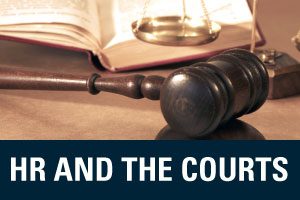HR and the Courts
 Each month, CUPA-HR General Counsel Ira Shepard provides an overview of several labor and employment law cases and regulatory actions with implications for the higher ed workplace. Here’s the latest from Ira:
Each month, CUPA-HR General Counsel Ira Shepard provides an overview of several labor and employment law cases and regulatory actions with implications for the higher ed workplace. Here’s the latest from Ira:
Trump Workplace Diversity Training Executive Order Halted by Federal District Court Nationwide
A federal judge blocked President Trump’s ban on “divisive” workplace diversity training conducted by nonprofits, federal government contractors and other recipients of federal funding, leaving the prohibition in place for federal agencies and the military on issues like “white privilege.” The suit was brought by the Santa Cruz Lesbian and Gay Community Center, Los Angeles LGBT Center, the AIDS Foundation of Chicago and other groups alleging that the Executive Order (EO), which bans workplace training on sensitive issues like unconscious bias and structural racism, violates the U.S. constitution’s free speech and due process protections. The federal district court judge agreed that the EO likely violates the U.S. constitution (Santa Cruz Lesbian and Gay Center, et al v. Trump (N.D. Ca., No. 20-cv-7741, 12/22/20)).
The restrictive EO was issued in September 2020 and was likely to be reversed by the new Biden administration. The judge criticized the president’s EO, concluding that it unfairly and unlawfully conditions federal grants on the grantee’s promise to abide by content-based restrictions on protected speech. The judge rejected the Trump administration argument that the EO prevents stereotyping and scapegoating and concluded that the fact that the government dislikes this speech does not justify the restriction. The judge’s injunction is effective nationwide.
Ohio Law Prohibiting Picketing Private Homes in a Labor Dispute Ruled Unconstitutional
An Ohio state court concluded recently that an Ohio law prohibiting picketing of private homes during labor disputes violates both the U.S. and Ohio constitutions. The suit was brought by a county educational union, and the court agreed that the law was based on the content of the picketing messages and therefore violated constitutionally protected free speech (Portage County Educators Association for Developmental Disabilities – Unit B, OEA/NEA v. State Employment Relations Board (2929 BL 508454, Ohio Ct of App., 11th Dist., No. 2019-P-0055, 12.31.20)).
The union represented employees at an agency that teaches individuals with developmentally disabled conditions and was negotiating a collective bargaining agreement. The union picketed six agency board member residences. The court ruled that a violation occurred in the labor dispute context. The law unlawfully prohibited the content of the picket sign, which was constitutionally protected as free speech. The Ohio Appeals Court reversed the decision of the trial court, which would have allowed the law’s prohibition, concluding that the law was “content neutral.”
Court Rejects Unsupported Claims of Sex Discrimination, Defers to University’s Tenure Denial Decision
A U.S. Court of Appeals recently rejected an “unsupported” claim of sex discrimination in a tenure denial case, noting that the university’s process involved dozens of men and women who “overwhelmingly” concluded that the plaintiff, an assistant professor, did not meet the university’s scholarship requirements for tenure. In these circumstances, the court concluded that courts should defer to such university decisions unless clearly unsupported (Maras v. Curators of the University of Missouri (8th Cir., No. 19-02875, 12/29/20)).
In the case, the plaintiff’s tenure application was voted down by multiple individuals in five of the university’s six steps, preliminary to the final review of the chancellor who also rejected the application on scholarship grounds. The court concluded that “it is difficult to believe” that dozens of people who gave written reasons for their conclusions all harbored sex-biased discriminatory animus. The court noted that the plaintiff failed to accuse many of those who rejected her application of sex discrimination.
New Department of Labor Rule Allows Employers to Offer Independent Contractors Benefits Without Triggering Employee Status
The worker classification rule finalized by the U.S. Department of Labor (DOL) on January 6, 2021, allows employers to offer independent contractors benefits without triggering employment status. The rule, which will allow employers additional ability to attract and keep talent, will allow employers to offer some benefits to their independent contractor pool without altering employment status. The rule allows employers to offer slightly different benefits to independent contractors than it offers regular employees and maintain the structure of the company-contractor relationship.
The DOL reiterated the caveat that an employer who offers its independent contractors health and retirement benefits on the same basis that it offers those benefits to its regular employees may be indicating that the worker is not an independent contractor, but rather a regular employee.
NLRB Religious Exemption for Higher Ed Institutions in Play Again With Regard to Faculty Unions
A Catholic university in Florida may be the next battleground for a National Labor Relations Board (NLRB) determination as to whether to take jurisdiction over unionized religious colleges and universities. A faculty union at St. Leo University in Florida appears ready to bring its case to the NLRB under the Biden administration following the university’s decision to cease recognition of the union under the current NLRB rules handed down in the Bethany College case. In the Bethany College case, the NLRB reversed the 2014 precedent of the Pacific Lutheran University case and ruled that the agency would not assert jurisdiction over faculty union cases at religious colleges and universities.


